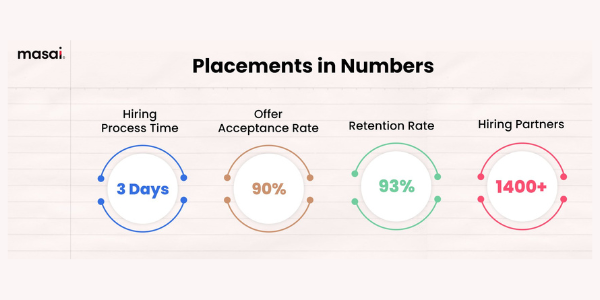
masai
View Brand PublisherHow Masai School is helping launch careers and accelerate growth for Tech Companies by bridging the skill gap
Inspired by the East African tribe ‘Maasai ’, who thrive on skill development as opposed to formal education and degrees, Prateek Shukla’s Masai School is enabling aspirants to go beyond their educational background to launch their careers with hands-on training in an outcome-based learning model.
Unemployment is not new in India. Lack of focus on holistic skill development and job readiness leaves the country’s youth ill-equipped to enter the workforce, making it hard for tech recruiters to find the right talent. The Indian workforce reported the highest skills gap after Brazil. As India grows into a knowledge economy, rapidly adopting technology in the manufacturing and service industries, the emerging gaps at the level of higher education are seen as a major constraint.
The 2019-20 Global Skills Gap Industry Report found that 92 percent of employees in India believe that there is a skills gap in the country and 76 percent feel they have been personally impacted by it.
But, what are we overlooking?
The rising unemployment in the country is often incorrectly attributed to a shortage of skilled jobs. Though the demand for Indian engineers and analysts is rising worldwide, 63 percent of IT businesses in India report a shortage of skilled talent. Most graduates starting at an entry-level from Tier I institutes, need further training to be job-ready once hired. Students from Tier II and III colleges have a theoretical understanding of some concepts with little or no demonstrable skills. Thus, they need significant further investment in reskilling.
Enabling business growth with skilled talent
Prateek Shukla, Co-founder, and CEO, of , and his team are bridging the gap between the demand and supply of skilled candidates for the Indian tech sector job market. As organizations can no longer rely on aptitude and theoretical tests alone, which at best are indicative of potential, businesses trust Masai to fill this gap. Unicorns and soonicorns like , , , , , , , and are recruiting from Masai and have benefited from Masai's skilled talent.
With over 1500+ hours of practice-based learning, Masai makes students from varied educational backgrounds job-ready with demonstrable industry skills in software development and data analytics.
Speaking on curriculum development, Prateek adds, “Over 50 tech CTOs and industry leaders help Masai develop and update our courses so candidates can start working immediately with the relevant skill sets. This feedback loop keeps our talent fresh and relevant which helps us place Masai graduates at some of the most sought-after engineering teams in India.”
Since Masai was envisioned keeping the industry in mind, currently there are no costs associated with hiring from the organization.
Why Masai?
Masai is not just another higher education institute. By bridging the gap between the demand and supply of skilled candidates for the private-sector job market, Masai is providing skilled candidates to some of the top companies, startups, and MNCs. Added to this, they’re creating an exclusive talent pipeline for some of the ‘best places to work’.

- Recruiters come back to Masai because the hiring process is extremely streamlined. A company can expect 17-18 percent of the candidates to make the cut.
- For Role 1 Developer position, Masai shares six recommendations so employers don’t have to sift through 100s of applicants.
“Our students are able to stand shoulder to shoulder with the rest of the tech talent in the country and build applications that you and I use on a day-to-day basis. 46 percent of our students in the last year were placed at repeat hiring partners and this is a large feat considering our student base grew 8x over the last year,” adds Prateek.
Pedagogy highlights
The curriculum is designed based on continuous feedback from the industry over various batches, and delivered by instructors with development experience. “ Masai’s mission has always been to recognize and develop India’s untapped potential. This is, in large part, due to our pedagogy. We have skilled students from backgrounds like BCA, BA, BTech (Mechanical and other non-IT streams) to become developers and they on average perform better than college graduates with coding knowledge,” says Prateek. The Masai pedagogy is based on practice-based- learning, mastery-based progression, holistic development (technical + soft skills), and intensive testing and evaluation cycles.
Students and alumni of Masai’s software development and data analytics programs learn skills that help them contribute to their jobs from day 1. This is done with an outcome-based expectation wherein students learn at zero upfront fee and only pay for their learnings once they get placed.
How are candidates selected?
Prospective candidates have to write an entrance test to be selected. Once selected, they are admitted into Masai’s outcome-driven program to undergo intensive hands-on training, and work on multiple projects. They are constantly assessed throughout the program duration before they can be accredited as industry-ready by Masai.
Masai has over 1,300 students working at 300+ top startups and MNCs.
”Three years since we started, we have had an impact that I could not have envisaged. Of the graduated students, 96 percent are currently employed, earning on average Rs 7.5 lakh per annum at some of India’s biggest tech companies. We have 1400+ hiring partners, and the number keeps growing daily. And that's what keeps us going, knowing that our skilled talent is making a difference,” Prateek shares.










![[Startup Bharat] Y Combinator-backed BeWell Digital is enabling the digital transformation of radiologists](https://images.yourstory.com/cs/2/40d66ae0f37111eb854989d40ab39087/ImagesFrames31-1648033042143.png)
